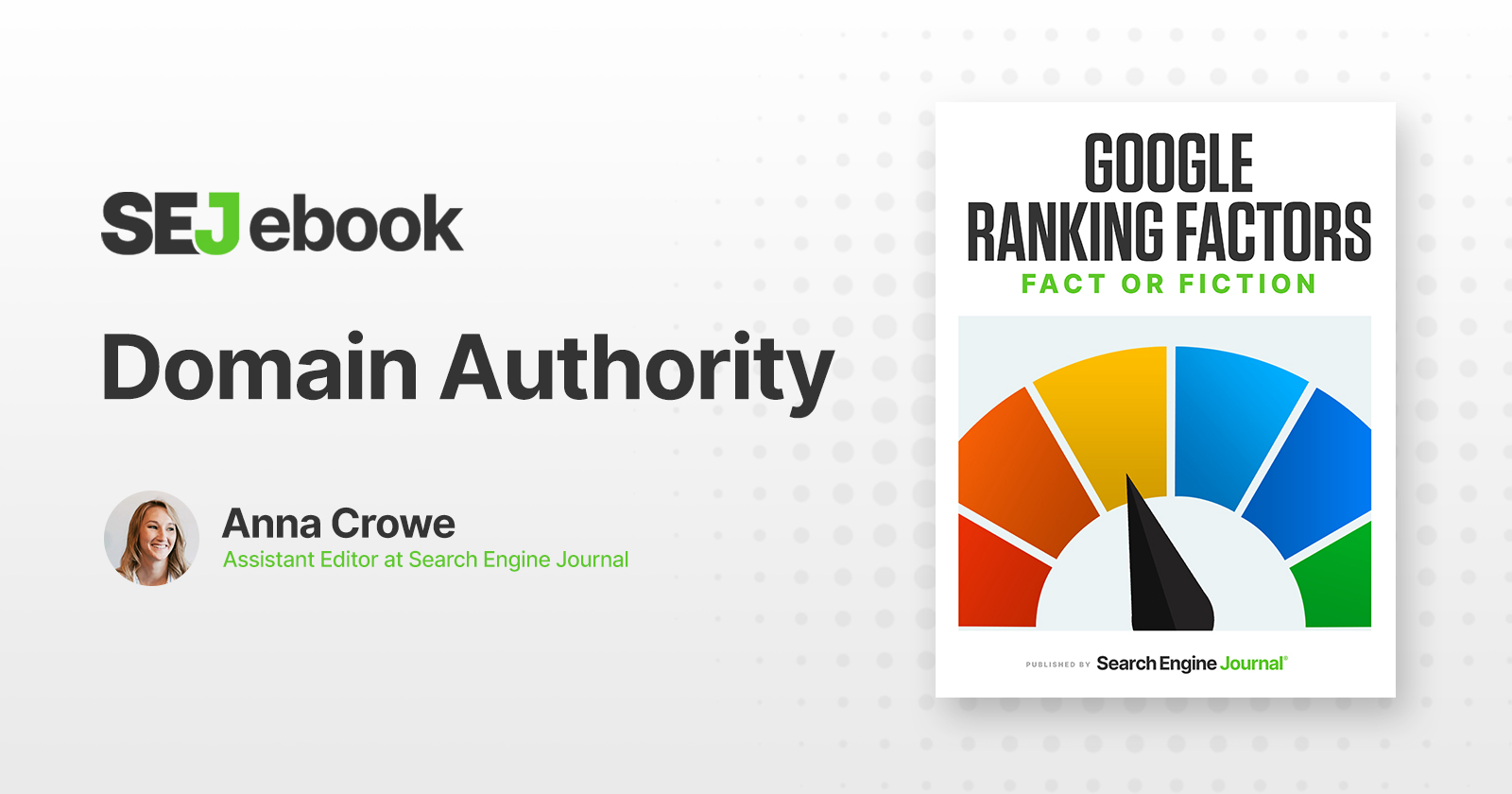Pop quiz: There’s a popular ranking metric obsessed over by SEO pros – one that can grade the quality of a site, estimate how easy/difficult it is for that website to rank in search engines, or tell you how valuable a link from that site might be for your SEO.
Are we talking about Domain Authority or PageRank?
If you said PageRank, congrats! You’ve finally woken up from that coma you went into around 2015.
For the rest of us, and as you probably should have guessed from the title of this article, we’re talking about Domain Authority (DA).
Advertisement
Continue Reading Below
Why do some believe DA a ranking factor?
First things first: Domain Authority is Moz metric. It is a score that ranges from 0-100.
And ever since Moz released DA, it’s caused confusion in the SEO industry.
Domain Authority has been compared to, and confused with, Google’s PageRank – specifically, the retired Toolbar PageRank. At times, DA has even been mistakenly referred to as a “Google metric.”
Some SEO gurus represented DA as the golden ticket into Google’s algorithm. It was a promise to boost your rankings by opening the doors to how search engines rank your site.
Advertisement
Continue Reading Below
These so-called SEO experts are at the helm of these types of emails that flood your inbox.
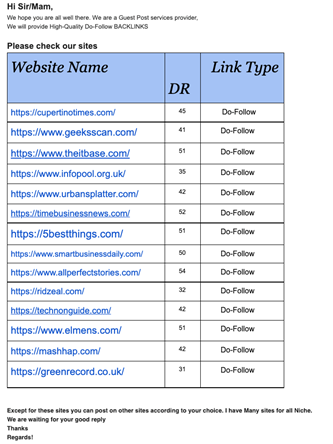 Screenshot from Gmail, September 2021
Screenshot from Gmail, September 2021It’s difficult to deny when well-known websites continue to put confusing information out there.
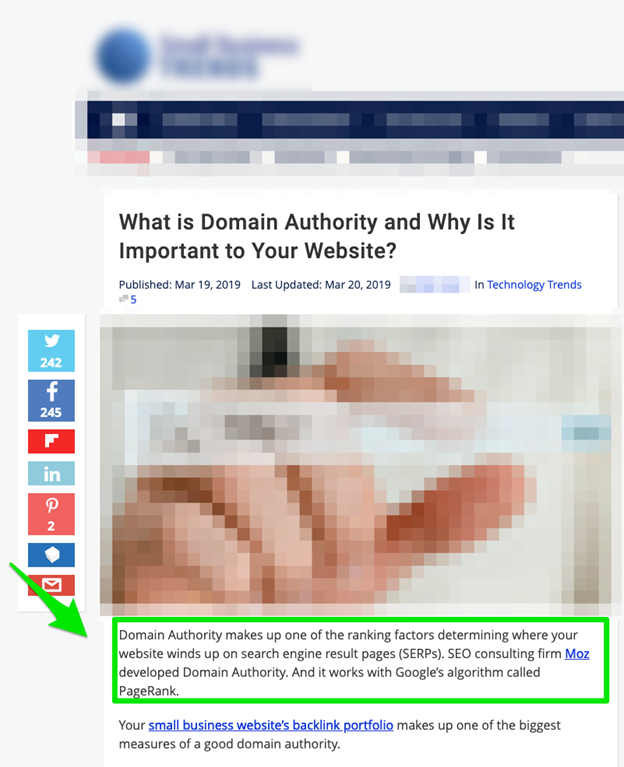 Screenshot from Smallbiztrends.com, September 2021
Screenshot from Smallbiztrends.com, September 2021Hmmm, smells like BS to me.
To get to the truth about domain authority, we went to the source itself – the team at Moz.
Domain Authority (DA) Vs. Domain Authority (Concept)
Before continuing, we need to make an important distinction.
There are two types of “Domain Authority.”
We’ve already talked about Domain Authority, or DA, the Moz metric.
But there’s also the concept of domain authority.
Basically, the idea is that Google gives more authority to certain domains – and that you can build authority for a domain over time by doing things such as publishing great content and attracting high-quality links.
All of this gives certain sites an inherent ranking advantage in the SERPs.
Advertisement
Continue Reading Below
In simplest terms, it would explain why it’s easy for a website like The New York Times to rank in Position 1 whereas Joe’s News Blog, which launched last month, would have a much harder time.
We investigate this idea more in our chapter on Website Quality Score.
The Claim: Domain Authority As A Ranking Factor
Before we probe the Moz team on domain authority, it’s important to understand the basics.
What Is Domain Authority?
Moz’s website states that:
“Domain Authority (DA) is a search engine ranking score developed by Moz that predicts how likely a website is to rank in search engine result pages (SERPs). Domain Authority scores range from one to 100, with higher scores corresponding to greater likelihood of ranking.
Domain Authority is based on data from our Link Explorer web index and uses dozens of factors in its calculations. The actual Domain Authority calculation itself uses a machine learning model to predictively find a ‘best fit’ algorithm that most closely correlates our link data with rankings across thousands of actual search results that we use as standards to scale against.”
Advertisement
Continue Reading Below
Are Domain Authority & Domain Rating The Same?
To be fair, Moz isn’t the only SEO tool coming up with its own search engine algorithm metrics.
After Moz led the way, other SEO tools followed.
Semrush has an Authority Score.
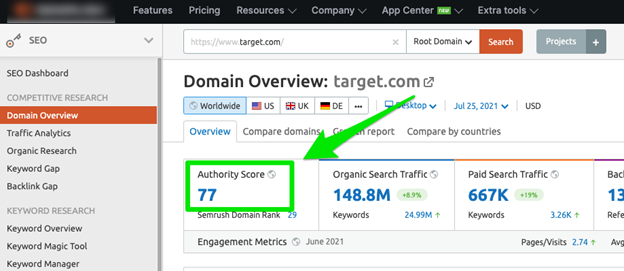 Screenshot from Semrush.com, July 2021
Screenshot from Semrush.com, July 2021Ahrefs has Ahrefs Rank.
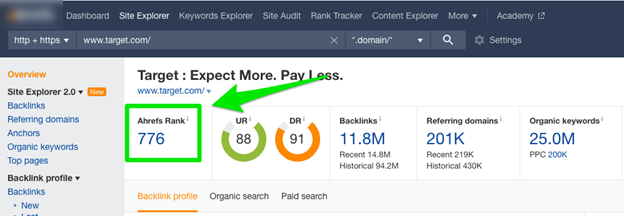 Screenshot from Ahrefs Site Explorer, September 2021
Screenshot from Ahrefs Site Explorer, September 2021That’s where domain rating stems from. Ahrefs used to call Ahrefs Rank “domain rating.” In 2018, Ahrefs improved the formula and changed the name to Ahrefs Rank.
Advertisement
Continue Reading Below
Ahrefs initially used the formula using backlinks only. In contrast, domain authority represented your entire onsite and offsite SEO efforts as one.
Domain Authority As A Ranking Factor: The Evidence
No, Domain Authority is not a ranking factor.
To be clear, Moz came forward to clear this up, confirming:
“Domain Authority is not a Google ranking factor and has no effect on the SERPs.”
Then what is Domain Authority?
It’s a way to gauge website performance. It should be used to provide an idea if your SEO strategy is following best practices.
Domain Authority As A Ranking Signal: Our Verdict
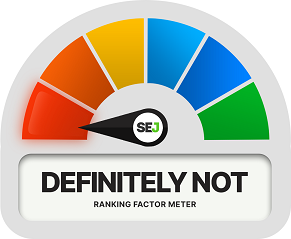
Domain Authority is just one metric you can use to compare your site to a competitor’s site.
Advertisement
Continue Reading Below
Don’t obsess over it. In fact, you can safely ignore it if you want.
If your Domain Authority drops, it doesn’t necessarily mean your Google ranking will drop.
But above all else, like BBB ratings, it just wouldn’t make sense for Google to use a metric created by a third-party to help rank its search results.
Featured Image: Paulo Bobita/SearchEngineJournal
